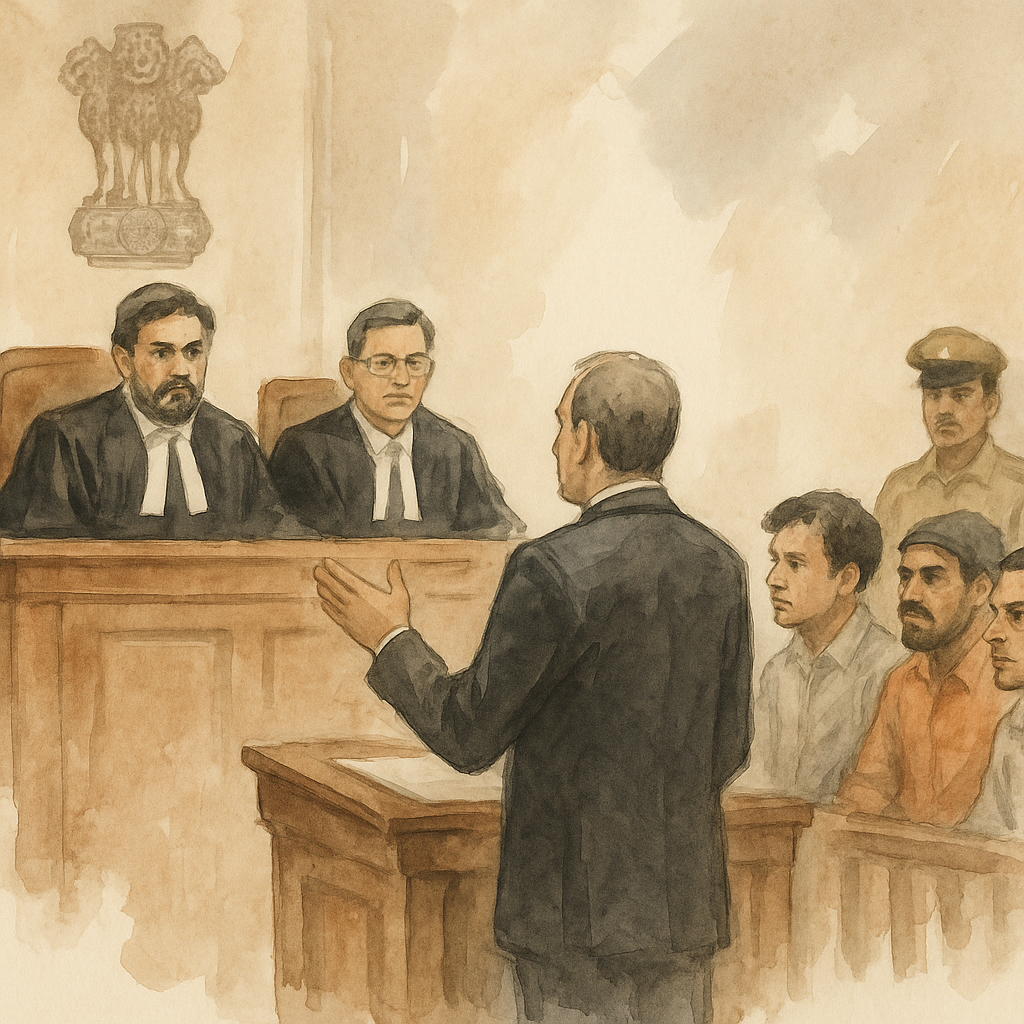Simplified Explanation of the Judgment
The Patna High Court, in a judgment dated 28 September 2020, dismissed a government appeal challenging the acquittal of six accused persons in a politically motivated murder case.
The case originated from a 2014 incident in West Champaran district. According to the prosecution, the victim, an elected village head (Mukhiya), was killed because his election victory was opposed by political rivals. His father and uncle alleged that they heard gunfire, rushed to the scene, and found the victim injured. They claimed the victim made an oral dying declaration, naming the accused, including his rival.
The trial court, however, acquitted the accused in 2018. It found serious doubts about the reliability of the prosecution witnesses. Independent witnesses did not corroborate the claims of the father and uncle. Medical evidence suggested the victim could not have spoken after receiving the fatal injuries, making the alleged dying declaration doubtful. The trial court also noted contradictions in the presence of family members at the scene.
The State of Bihar appealed, arguing that the testimonies of the father and uncle were sufficient, and that minor inconsistencies should not undermine the case. The prosecution also criticized reliance on mobile tower records, which had not been formally proved under Section 65B of the Evidence Act.
The defense countered that the trial court had correctly analyzed the evidence and highlighted that even medical evidence showed instantaneous death, making any dying declaration improbable.
The High Court carefully re-examined the evidence. It emphasized settled principles:
- In circumstantial evidence cases, the chain of evidence must be complete and point only to the guilt of the accused (Sharad Birdhichand Sarda v. State of Maharashtra, AIR 1984 SC 1622).
- Medical evidence ordinarily has corroborative value, but when it negates eyewitness accounts, it may override them.
- In appeals against acquittal, if two views are possible, the appellate court should not interfere with the acquittal unless the trial court’s judgment is perverse (Dwarka Dass v. State of Haryana, (2003) 1 SCC 204).
Applying these principles, the High Court upheld the acquittal. It found that the prosecution failed to prove guilt beyond reasonable doubt. The alleged dying declaration was unreliable, independent witnesses did not support the case, and the medical evidence suggested the victim could not have spoken after being shot.
Accordingly, the government’s appeal was dismissed, and the acquittal stood confirmed.
Significance or Implication of the Judgment
- For criminal law: The ruling reinforces the principle that conviction cannot rest on doubtful evidence or incomplete circumstances.
- For appeals: It underlines the limited scope of government appeals against acquittals — unless the trial court’s decision is manifestly perverse, appellate courts will not interfere.
- For society: The case highlights challenges in prosecuting politically sensitive murders, where independent witness testimony is often missing, and reliance on partisan accounts may not meet the high standard of proof.
- For medical evidence: The judgment shows how medical testimony can decisively weaken prosecution claims, especially concerning dying declarations.
Legal Issue(s) Decided and the Court’s Decision
- Issue 1: Whether the oral dying declaration attributed to the victim could be relied upon.
- Decision: No, medical evidence showed the victim could not have spoken after his injuries.
- Issue 2: Whether circumstantial evidence (seeing accused flee) was sufficient.
- Decision: No, isolated circumstances cannot sustain conviction unless the chain of evidence is complete.
- Issue 3: Whether the trial court’s acquittal could be overturned.
- Decision: No, since the trial court’s findings were reasonable and not perverse, acquittal was upheld.
Judgments Referred by Parties
- Sharad Birdhichand Sarda v. State of Maharashtra, AIR 1984 SC 1622
- Solanki Chimanbhai Ukabhai v. State of Gujarat, (1983) 2 SCC 174
- State of U.P. v. Hari Chand, (2009) 13 SCC 542
- State of U.P. v. Krishna Gopal, (1988) 4 SCC 302
- Dwarka Dass v. State of Haryana, (2003) 1 SCC 204
Judgments Relied Upon or Cited by Court
- Sharad Birdhichand Sarda v. State of Maharashtra, AIR 1984 SC 1622
- Solanki Chimanbhai Ukabhai v. State of Gujarat, (1983) 2 SCC 174
- State of U.P. v. Hari Chand, (2009) 13 SCC 542
- State of U.P. v. Krishna Gopal, (1988) 4 SCC 302
- Dwarka Dass v. State of Haryana, (2003) 1 SCC 204
Case Title
State of Bihar v. Girish Lal & Others
Case Number
Govt. Appeal (DB) No. 7 of 2019
Citation(s)
2021(2) PLJR 1
Coram and Names of Judges
- Hon’ble Mr. Justice Dinesh Kumar Singh
- Hon’ble Mr. Justice Arvind Srivastava
Names of Advocates and who they appeared for
- For the Appellant/State: Mr. Dilip Kumar Sinha
- For the Respondents: Not mentioned
Link to Judgment
MjUjNyMyMDE5IzEjTg==-1VUlycG6XXQ=
If you found this explanation helpful and wish to stay informed about how legal developments may affect your rights in Bihar, you may consider following Samvida Law Associates for more updates.









